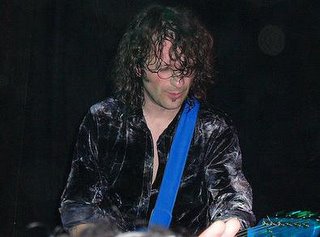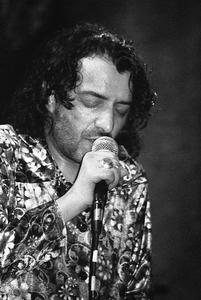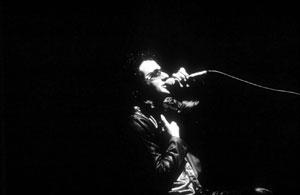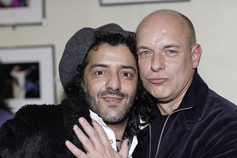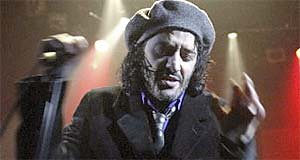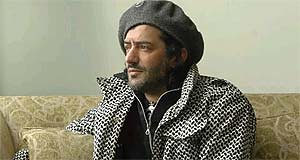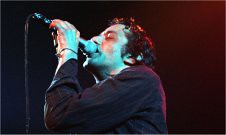Brian Eno, who spent six months in St. Petersburg in 1997, returns to the city for the live premiere of his latest collaboration with Algerian-born, Paris-based singer Rachid Taha. The British musician, producer and lecturer who contributed to Taha's 2004 album "Tekitoi?," has recently released an album with King Crimson's Robert Fripp. Eno was also active in the British general election earlier this month and was in New York working with Paul Simon.
During his stay in St. Petersburg in 1997 Eno made two audio-visual installations, at Pavlovsk Palace and the State Russian Museum's Marble Palace, and wrote a monthly column about life in St. Petersburg for the British Sunday newspaper The Observer.
Interviewed by The St. Petersburg Times at his London studio, Eno spoke about his love for Arabic music, his new album of "proper" songs and his views on Russia.
Q: You spent a lot of time in Russia in the past, but you will be performing in Russia for the first time?
A: That's right, it's the first time that I've ever played in Russia. I don't perform much anywhere, so I'm not really a very active performer. I had some installations in Russia, though.
Q: What's your role in the upcoming Russian concerts? Do you see yourself as a member of Rachid Taha's band?
A: Yes, that's right. I'm using my various electronic devices to change the sound of some of the instruments, and I also have a synthesizer there. So I do play sometimes and I sing backing vocals.
Q: Is it true that you have developed some software specifically for the concerts?
A: I didn't develop it. It's some equipment that is available already, but I think I'm the first person to really use it in this way. So my use of it is original, I think.
Q: Can it be said that the Russian concerts will be the world premiere of your performing with Taha?
A: I did one other show with him in Paris [on April 1]. That was a sort of experimental show to make sure that everything worked. But yes, that's the only other experience of it.
Q: What do you find interesting about Taha?
A: First thing I like and have liked for a long time Arabic music. I've liked it for a very long time. I have a quite big collection of Arabic records. So I'm very open to that kind of music. Then what's interesting about Rachid is he's sort of made a new kind of music, halfway between Western rock and Arabic music, so Western rock and rai, actually it's the kind of music he comes from, which is Algerian popular music. And it's very, very, very exciting on stage. It's really one of the most exciting stage things I've ever seen, his performances. And so for me it was a way into Arabic music as a performer. As I said I've loved it for years, I have many, many, many records of Arabic musicians and singers, but I've never been able to perform it before.
Q: How did you meet him?
A: I met him because his manager also used to be a manager of Fela Kuti, and Fela Kuti is possibly my favorite musician in the last 50 years, I guess. When Fela died, I was asked by an English black music magazine to write an obituary about Fela. And his manager saw this and said he thought it was the best obituary that has been written about him. He asked me if he can quote that on the records of Fela's that he was going to re-release. They were just re-releasing all of his albums, which is a huge number. So I said, of course, you can. And then to say thank you he sent me all the albums when they came out again. And then we kept in touch and he said to me one day, "Oh, I have this guy coming over from Paris to play, you might like to check him out." And so I met Rachid. And actually one of the most interesting things that Rachid was playing in his set was this song which is one of my favorite Arabic songs. It was a hit for a singer called Farid al-Atrash, I think in the early 1970s or something like that, it's a classic song called "Habina." And they were very, very surprised that I knew this song. I know all the words of it, in fact. I don't know what they mean, but I can sing the song in Arabic.
Q: Taha also sings The Clash's "Rock the Casbah." (The 1982 song was inspired by the banning of rock music in Iran under Ayatollah Khomeini.) Do you find that he gives it a new meaning?
A: Oh yes, it's very funny for a start. There's something that's very funny about him turning the piece round and turning it back into an Arabic piece. I think actually it's extremely good, I think it's better than The Clash's version, actually. And I think The Clash like it as well.
Q: One article actually described Rachid Taha as "France's first punk rocker."
A: Really? It's funny because he is a strange person on stage. He's not really punk exactly. He's somewhere between a kind of cabaret nightclub performer and a punk. Something very peculiar about his stage persona. It's not so aggressive as the punk stance is. In fact, he's not aggressive. He sort of makes fun of himself, in a way, so it's not quite forceful as punk tends to be.
Q: Is there any language barrier (between you and him) as he sings in Arabic and French more than in English?
A: He hardly sings in English at all. And in fact he mostly sings in Arabic. There's a couple of songs where he sings a bit of French, but mostly it's Arabic. Well, that doesn't bother me at all; as I say, I've been listening to Arabic records for a long time, so I like the sound of the language a lot, even if I don't understand it. But I've never been so interested in the meaning of songs anyway, so to me it's fine if he sings in a foreign language.
Q: Why are the concerts in Russia, rather than in London, for instance?
A: Well, I have a feeling about Rachid. I think what Rachid is doing musically and politically is very, very important. And the two places I would really like him to be heard and accepted are Russia and America. This is because I think it would be good for both of those countries to embrace an Arabic artist, you know, somebody who is clearly from that culture and is proud of it. He's an interesting character, because his politics are not at all simple, he's not a kind of obvious Islamist, he's quite critical of the Arab world, but he's quite critical of the Western world as well. So his political position, which is very much a part of what he's doing, I think, is quite subtle. It's not an obvious position. But mostly, I think, you know, I would really love to see him being a big success in America. You know, America and Russia are two countries that both have a problem with Muslims. That would be good if they could get over that sooner or later.
Q: Do you follow the political situation in Russia? It looks like you have an interest.
A: Yes, I mean all I know about the political situation in Russia is really what I read in our newspapers and in The St. Petersburg Times, that's all I read. So I don't really know the internal Russian view of the situation, if you understand what I mean. But I see a real difficult situation going on for people. You know, there's [President Vladimir] Putin who undoubtedly in some respects has been very good for Russia, but it seems to me he's becoming more and more like an old-style Russian leader. He's becoming more and more authoritarian. So I think this is a problem, even though I can understand why people like him as well. He has pulled things together. But I hope he doesn't go down that road.
Q: You took part in yesterday's elections in the U.K. supporting the Liberal Democrats. Was there any hope that they would win?
A: No, there was never a hope that they would win. What I hoped was they could become the second party, rather than the third party. Their political position is more left-center than Labour's position. So Labour have gone increasingly to the right, and of course the Conservatives are on the right. So we have had a situation where there's really no proper opposition in England. We don't really have an opposition party. And I hoped that the Liberal Democrats would be able to take that position of being the new opposition party. However, it hasn't happened. The election results to me are sort of disappointing, because nothing very much changed, actually. Life goes on as it was before.
Q: Returning to music, your most recent recorded work was "The Equatorial Stars," the collaboration album with Robert Fripp. How did it happen?
A: Well, you know, Robert and I made two records together, many years ago. We made our first record 30 years ago, actually. Or even more. Yeah, 32 years ago, I believe, was our first album together.
Then we made another one 30 years ago. ["No Pussyfooting," 1973, and "Evening Star," 1975] And then - a long, long silence. So, anyway, we stayed friends all these years and he worked on a lot of my records. And then since the time we first made records together, my whole practice as a composer has changed a lot. Of course, I use computers now and the all sorts of possibilities that came up with computers. And I started to think, "Hm, this could be interesting, Robert and I, I might be able to do something good in this new world of music. So I said to him a few years ago, whenever we started this record, two years ago or something. I said, "When you come over and will see if we can try some new things." Because what we've done has always somewhat depended on whatever technology was around at the time. And my sort of use of that technology to do new things with. So it was a totally pleasurable record to make. As always working with him. We've always had a very good time. We share same kind of humor. There's always a lot of laughing going on.
Q: You have done an album of "proper" songs recently, which will be released next month ["Another Day on Earth."] What kind of songs are they? It's very interesting because it's something that people probably didn't expect from you.
A: I hope so. Yes, I mean it is something that people didn't expect. It's kind of harder thing for me to do than to make an ambient record. I can make ambient records during my sleep now, if I want to. It's very easy for me that area. So I was interested to make some music in what is a very challenging form, namely the song format, it's a very difficult form to work in.
So I had a couple of thoughts in my mind. One is I want to do new things with voices that people haven't done or haven't been doing much of. And I want to do new things with sound, the kind of things that don't usually appear in songs. So some of the ideas I learned in instrumental music I want to transfer in the songs. Instrumental and ambient music, you know. And that's what I've been doing.
Q: You are planning to have it released in Russia first, rather than in the rest of the world. Why?
A: I thought it'd make a nice change. I want to release in Russia and China first just to make a difference, because everything always goes by the same routine. Of course, it's released in England first with the English newspapers do it, and then the Russians get it after a long time. I thought, let's change it around a little bit. That also gives me a chance to fly over some British journalists to Russia, St. Petersburg, probably where they can actually see the country because most British people have never been to Russia. They have no idea whatsoever about it, how it might be. So it's a sort of slightly educational enterprise.
Q: That's very interesting that you want more people in England to know about Russia and St. Petersburg.
A: Yes, I think Russia is a very, very interesting place because for 70 years they developed as a sort of parallel culture. Not ours, not depending on us, separate, highly cultured, but a separate society. So therefore it's a kind of very interesting laboratory experiment that we can learn something from. And we should take it seriously, you know, the political view in the West is "Oh, we won the Cold War," you know, "Russia lost," so the idea is the whole last 70-80 years of Russian history can be forgotten about. And I don't believe that.
Q: You wrote six columns from St. Petersburg for The Observer in 1997 - was it also an educational thing for you?
A: Yes, think so. It's too easy to take the political story that's told about Russia in the West. It's one story, the story of the Cold War and the failure of communism and blah, blah, blah. That's one story. The other story is, you know, you have a living rich culture there, in many ways more passionate and committed than ours is. And I think that's something we should be paying attention to. And, of course, I think the same thing about China as well. I also want to get people interested in that place.
Q: You'll leave for New York tomorrow to work on a project with Paul Simon. What is it like?
A: I'm helping him to write some songs ... In fact, what I'm doing really is making new musical landscapes for him to write songs over, that's basically what I do.
Q: There were press reports recently about you joining Roxy Music's reunion this summer.
A: No, no. It's not true. It was in the bloody Times newspaper which is the worst English newspaper, and then it's of course been repeated hundreds of times everywhere, but it's not true and never was true.
Q: I re-read our interview from 1997 today. You said then that "music on its own is a dying medium." Do you still think so?
A: Yes, yes, I do. What I mean by that ... I don't mean dying, I mean it's taking, it occupies a smaller part of the public cultural conversation. And I think that part will keep getting smaller. You know, all I'm saying is there was a time when music was the way people spoke to each other, certainly in the 1960s and the 1970s, and, in Russia, in the 1980s, I would say, as well. And I don't think it's true anymore, and people speak to each other in a lot of different ways, now, including music, but music doesn't have the same sort of central position that it used to have. That's OK. Things change, you know.
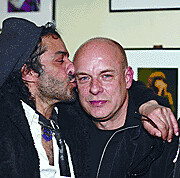 pic by IGOR VERESHCHAGIN / FOR SPTand/or ALEXANDER BELENKY / SPT
pic by IGOR VERESHCHAGIN / FOR SPTand/or ALEXANDER BELENKY / SPTAaaaand Rfi too published
an article by Bialka Wlodarczyk!!!/
Eeeeet Rfi a aussi publié cet article par Bialka Wlodarczyk!!!
Thanks marie and roso!
Merci marie et roso!Disclaimer: this is a fan site the objective of which is to inform, gather and collect material on Rachid Taha. The pics and excerpts of interview above come from Internet and were copied by Rachid Taha's fans for Rachid Taha's fans so that they could be given more access to them. They can be withdrawn on request.kelma